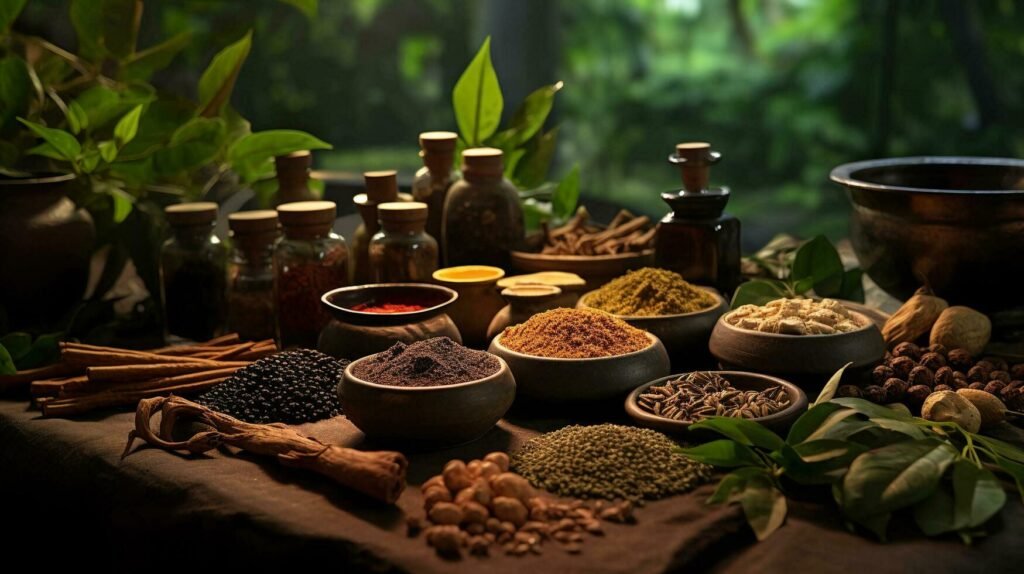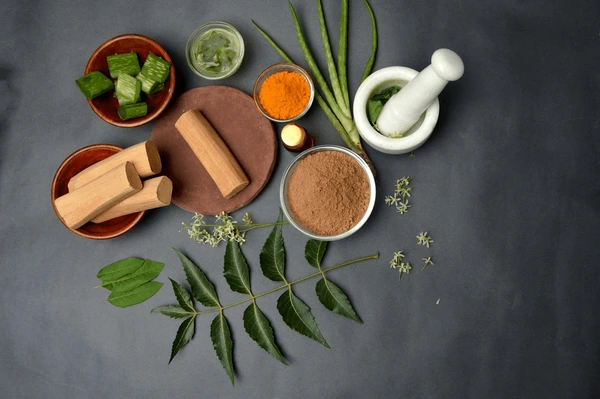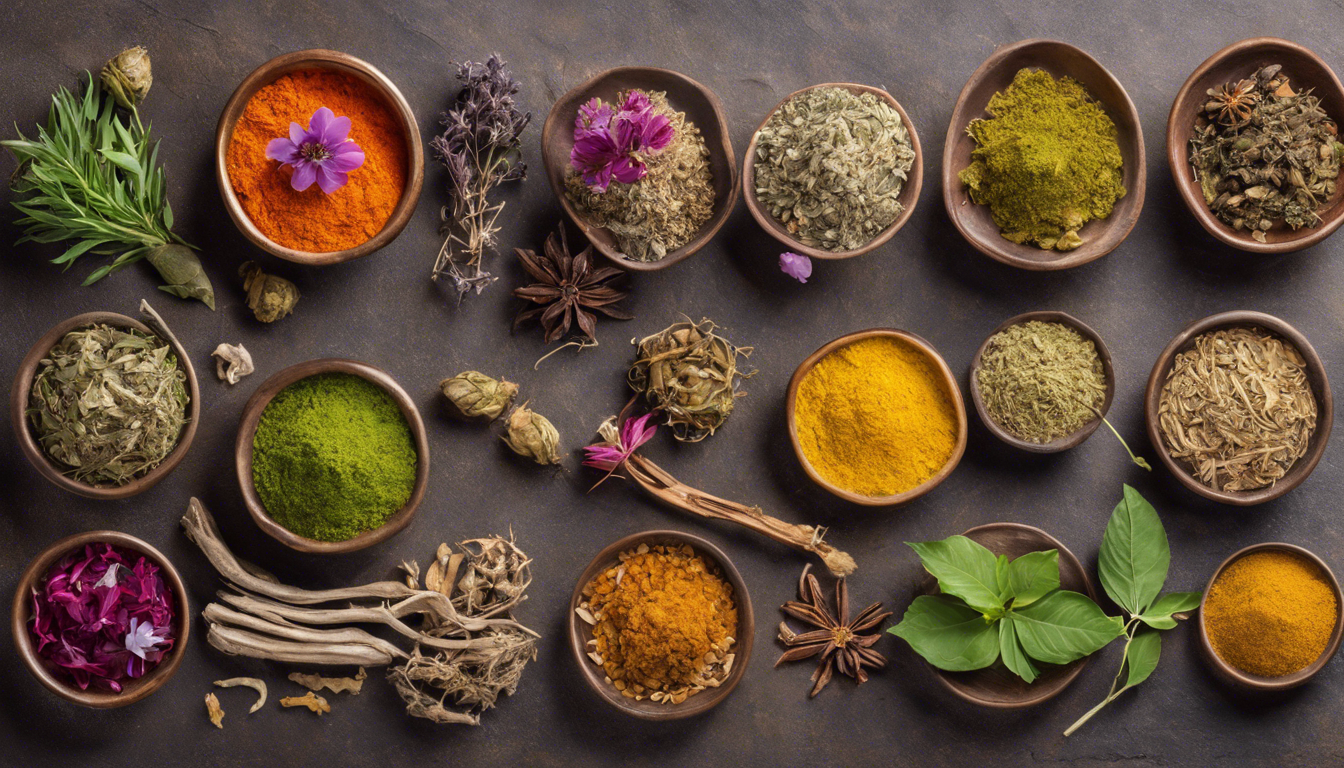Sneak Peak
“Ayurvedic Herbs for Perfect Dosha” People seek holistic well-being. Ayurvedic herbs are key to it. They help achieve health and balance the doshas—Vata, Pitta, and Kapha. These old plants offer a time-tested way to wellness. People have honed it over thousands of years. Today’s world demands swift adaptation. These herbs are key for maintaining health. We use specific Ayurvedic herbs for weight loss. They are also used for other goals. They have also become popular. They’ve shown how versatile and effective they are. They help with many health concerns.
This article looks at the importance of balancing doshas. It covers the use of Ayurvedic herbs. It guides readers fully. It helps them understand and use these old remedies. The sections explore herbs for Vata in detail. They also cover herbs for Pitta and Kapha doshas. They offer practical tips on using Ayurvedic herbs in daily life. Also, we’ll examine the more benefits of Ayurvedic herbs. They go beyond weight loss to cover physical and mental health. Adding these herbs to an Ayurvedic lifestyle completes the path to full health. This includes tips for wellness. It offers readers a path to renewed health and vitality.
Understanding Dosha Balance

What are Doshas? Ayurvedic Herbs for Perfect Dosha
Ayurveda is an ancient holistic medicine system. It shows a link between human health. The link connects three systems. They are in harmony and balance. They are Vata, Pitta, and Kapha. The doshas come from the five basic elements of the universe. They are: ether, air, fire, water, and earth. Each person has a unique mix of these doshas from birth. This mix shapes their traits – physical, mental, and emotional. Ether and air make up Vata.
It handles body movement and communication. It affects things like blood flow and nerve impulses. Fire and water make up Pitta. It oversees digestion and metabolism. It plays a key role in body temperature and energy production. Kapha is a mix of earth and water. It gives the body structure and lubrication. It keeps up strength and immune response.
Importance of Balancing Doshas
Balancing these doshas is key. It’s crucial for good health. Imbalances can arise from factors. These include diet, lifestyle, and stress. They lead to physical and mental problems. For instance, too much Vata can cause anxiety and digestive issues. An excess of Pitta can lead to its inflammation and anger. Imbalance in Kapha might lead to its lethargy and weight gain.
According to Ayurveda, knowing your main dosha’s traits can guide you. They can use this knowledge to make lifestyle choices that promote balance. This includes changing your diet. It means exercise and mental practices, like meditation. They tailor the practices to fix their doshas. These fixes excesses or deficiencies. Also, daily routines support the body’s natural rhythms. They are called Dinacharya. They also improve well-being. They stress the importance of regular activities. Examples are sleeping and eating.
Balancing Vata, Pitta, and Kapha is key. It helps individuals achieve their health. It supports physical health. It also boosts clear thinking. It helps with emotions too. This shows the deep impact of dosha balance on life.
Herbs for Vata Dosha

Chamomile
Chamomile is a good herb for those with a lot of Vata. It calms the nervous system. This is well-known. It also aids digestion. It helps to ease conditions like bloating and cramps. These are common in Vata types. Also, chamomile tea can speed up the metabolism. It can also soothe the digestive tract. This is helpful during the colder months when Vata can flare up. Honey and lemon added to the tea can help. But, chamomile may also dry out Vata constitutions. This is due to its diuretic properties. They can disrupt sleep. They do this by causing more nighttime urination.
Ginger
Ayurveda prizes ginger. It has intense heat. It’s an essential herb for balancing Vata dosha. It boosts circulation. It aids digestion. It helps with common Vata concerns. These include bloating and constipation. The spice is also known for its power to reduce inflammation and kill germs. They solve many Vata imbalances. These cause health problems. For daily use, adding ginger to meals or drinking ginger tea can help keep Vata balance. Ginger stimulates the nervous system. It improves mental clarity and focus. These are often needed by those with a Vata imbalance.
Ashwagandha
Ashwagandha is an adaptogenic herb. It is especially helpful for those with a Vata constitution. It stabilizes the body’s stress response. It also boosts vitality. It can calm the nervous system. It can also foster sound sleep. These effects are well-known. Ashwagandha is a boon for those with Vata-driven issues. These issues include anxiety and restlessness. The herb warms the body. This is generally good. Those with a high Pitta dosha exercise restraint when using it. It can worsen this condition if taken too much. Adding ashwagandha to other cooling herbs helps. Or, eating it with ghee and honey can ease these effects. It can also boost its rejuvenative properties.
Herbs for Pitta Dosha

Mint
In Sanskrit, people know mint as pudina. It’s celebrated for its cooling properties. These make it an ideal herb for balancing the Pitta dosha. The dosha comprises fire and water elements. This herb soothes the gut. It also boosts lung health. Mint can lower body temperature. This is helpful. This is especially true in summer or in hot climates that worsen Pitta. Eating mint, in teas or as a flavoring, helps digestion. It can also help ease symptoms like acid indigestion.
Coriander
Coriander is a powerful antidote to high Pitta. It has cooling and digestive properties. Ayurvedic medicine uses both the seeds. It also uses the leaves of coriander. They aid digestion and calm the digestive tract. This makes coriander a versatile herb for Pitta issues. These include hyper-acidity and inflammation. It’s great for treating urinary tract infections. It also helps with other heat-related conditions. It provides a cooling and detoxifying effect.
Shatavari
Shatavari is an Ayurvedic herb. It’s known for balancing Pitta dosha. It also feeds the female reproductive system. It supports the system. It cools and soothes. It helps manage and ease symptoms of high Pitta. These include inflammation and irritability. Shatavari is also good for digestion. It helps when Pitta is too high by cooling and calming the system.
Herbs for Kapha Dosha

Turmeric
Its vibrant golden color makes turmeric known. It balances Kapha dosha. This is due to its bitter, astringent, and pungent tastes. It heats and kindles agni (digestive fire). This is key for cutting excess Kapha and preventing ama (toxins). It’s also a versatile herb in Ayurvedic medicine. It supports the liver, muscles, joints, immune system, and skin. This makes it a versatile herb in Ayurvedic medicine.
Ginseng
People prize ginseng for its warming properties. They help reduce Kapha and may increase Pitta. It has a reputation as a panacea. It boosts mental and physical energy. It’s a big help for people with a Kapha constitution. It gives them an energy boost. Drinking ginseng tea can boost health. It can also help with mental fatigue, which is common in Kapha imbalances.
Black Pepper
Black pepper is another key herb for managing Kapha dosha. It reduces Kapha and Vata. It’s heating, light, and drying properties help. Yet, its sharpness can increase Pitta. Black pepper improves digestion. It also helps the lungs. These are often weak in Kapha types.
A daily tonic of black pepper and honey can be very beneficial. It aids digestion. It also clears mucus from the lungs.
How to Use Ayurvedic Herbs

Tea Infusions
Tea infusions are an easy way to use Ayurvedic herbs. They are simple and accessible. To make an herbal infusion, pour hot water over dried herbs. This lets the oils and properties of the herbs steep into the water. You can enjoy this hot, at room temperature, or over ice. For a single serving, use one teaspoon of herbs per cup of water. Use a handful of herbs for a larger pot with about 32 ounces to 49. Cover the herbs during the infusion. This keeps them strong. For stronger flavors, steep the infusion for a longer time. This also works for medicinal properties.
Herbal Supplements
Herbal supplements offer a strong dose. They contain Ayurvedic herbs. Ashwagandha, shatavari, and vidari kanda are examples. They are examples of them. Formulators plan them into tablets. The tablets manage and balance Vata dosha. They also plan Brahmi, bhringaraj, and guduchi in tablet form. They help balance Pitta dosha as well. People usually take these supplements. They follow the package’s directions. The directions may vary. This depends on the extracts’ concentration.
Incorporating Herbs into Diet
You can add Ayurvedic herbs to your diet. You can do this through various cooking practices. For example, grate fresh ginger into vegetable sautés. Or, add it to tea for it’s warming and digestive properties. Turmeric is for savory dishes. Adding it to a latte or a honey paste boosts its anti-inflammatory power. This is for skin benefits. Cinnamon has a versatile flavor. You can add it to oatmeal, baked goods, or curried dishes. It aids digestion and soothes the digestive tract. Additionally, you can also sprinkle pippali on meals. This enhances digestion and supports metabolic health.
Benefits of Ayurvedic Herbs

Enhanced Digestion
Ayurvedic herbs are crucial. They improve digestive health. Triphala is a good example. It’s known for its ability to reduce the inflammation linked to arthritis. It also improves bowel regularity. This helps people with gut disorders. These include irritable bowel syndrome. Cumin seeds do the same. They boost the secretion of digestive enzymes. This speeds digestion. It also eases symptoms like bloating and gas. Ginger supports digestion. It also has anti-inflammatory properties. They can soothe an upset stomach.
Improved Mental Health
Ayurvedic herbs are promising. They work in mental health care. This is true for conditions like schizophrenia. Yet, there is little systematic evidence. Brahmi improves learning, attention, and memory. It may also reduce ADHD symptoms. Its cognitive benefits are well known. Furthermore, Ashwagandha and Mucuna have adaptogenic properties. They help the body handle stress. They also promote mental well-being.
Boosted Immune System
Ayurvedic herbs boost the immune system. They boost its defenses. Ashwagandha is an example. It’s celebrated for its immune-strengthening capabilities. It boosts cell immunity. It cuts stress by regulating cortisol. Tulsi is another potent herb. It enhances the body’s response to infections. It does this by acting as an immunomodulator. Researchers have linked taking Cyavanaprasa to lower infection rates. They have also linked it to lower rates of allergies in children. This shows that Ayurvedic preparations can boost the immune system.
Ayurvedic Lifestyle Tips

Dietary Guidelines
Ayurveda emphasizes the value of a balanced diet. Tailor the diet to an individual’s dosha. This diet promotes health and well-being. The Ayurvedic diet encourages eating whole foods. These include fruits, vegetables, grains, and legumes. It also says to eat less processed foods. It’s also based on the idea that different foods can balance or worsen one’s doshas. Recommendations vary by one’s dominant dosha. For instance, sweet, sour, and salty tastes calm Vata. These foods are pungent, bitter, and astringent. They can help balance Kapha. Also, the diet advocates for mindful eating. Savoring food improves digestion and well-being.
Exercise Recommendations
Regular exercise is key. It’s key to an Ayurvedic lifestyle. It tailors to one’s specific dosha and the current season. Ayurveda recommends exercising to half your capacity. This helps prevent overexertion. It also supports long life and health. The best time to exercise is during the Kapha times of day. These times are 6–10 a.m. and p.m.
These times give natural strength and stability. We also recommend specific exercises. Tailors design them for different doshas. For example, Vata types may like gentle activities. They may like activities like yoga. Kapha types, in contrast, might need more tough exercise. They might need to jog to stay balanced. It’s also advised to do activities that fit the season and climate. This keeps you healthy. Ayurvedic Herbs for Perfect Dosha
Mindfulness Practices
Mindfulness and meditation are key to Ayurveda. They boost mental clarity and reduce stress. Practices, like meditation and yoga, raise awareness. They help. So does mindful eating. Daily, they do it. They also build presence. They slash anxiety and elevate mental wellbeing. For instance, research has shown this. Mindfulness meditation improves thinking. It’s also supports emotional well-being. Also, add mindfulness to activities. These include walking and eating. It can deepen your connection to the present. This promotes a balanced and fulfilling life.
The tips are Ayurvedic. They include personalized diets, exercises, and mindfulness. They help people find a harmonious balance. It’s between their mind, body, and spirit. This balance leads to better health and vitality.
Conclusion
The article explored Ayurvedic herbs in detail. It showed their key role in promoting dosha balance. It’s revealed the path to full wellness. Ancient knowledge roots this path. The insights are about the specific herbs for Vata, Pitta, and Kapha doshas. They show the need to personalize wellness. It must fit one’s unique needs. These proven remedies can help. Add them to your daily routines. Also, improving health. One can achieve this by watching their diet and lifestyle. This includes the body, mind, and feelings. This will lead to harmonized vitality.
Ayurvedic principles shape modern health practices. They’re worth a closer look. It also invites them to apply to these old methods. This pursuit enriches our well-being. It helps us understand health solutions.
FAQs
1. What is the herb that balances all three doshas?
Triphala mixes three strong herbs. They are also known as “three fruits.” They are Amalaki, Bibhitaki, and Haritaki. It’s known for its ability to balance all three doshas.
2. What are some effective ways to balance doshas in Ayurveda?
You can balance doshas in Ayurveda. You can do this through several practices:
- Ensuring you sleep before 10 p.m.
- Maintaining a regular daily schedule.
- Adopt a Vata-pacifying diet. It features drinks served hot and food prepared fresh, rich in oil.
- A generous use of sesame oil is in your diet.
- Engaging in Transcendental Meditation.
3. Which foods help balance all three doshas, especially in summer?
Balance all three doshas in summer. Consider adding these foods to your diet:
- Gourd variety vegetables are cool. They are fibrous and easy to digest.
- Beal and watermelon, which are refreshing.
- Curd and amla, known for their cooling properties.
- Coconut water and cucumber, which help to hydrate and cool the body.
- Lemon, which adds a refreshing zest and aids digestion.
4. Which herb is regarded as the most significant in Ayurveda?
Ashwagandha is the king of herbs in Ayurveda. It is a traditional rasayana. A rasayana is a longevity tonic. It promotes health. It also promotes well-being and balanced energy. Ayurveda considers Shatavari the best herb. This is unlike modern medicine.
- What are some herbs for boosting immunity in Ayurveda?
- Ashwagandha is known for its adaptogenic properties. It boosts cell-mediated immunity and reduces stress. This can improve immune function.
- Tulsi (Holy Basil) acts as an immunomodulator. It enhances the body’s response to infections.
- Guduchi is another potent herb. It helps boost immunity. It boosts the body’s natural defenses.
- How can Ayurvedic herbs be used for mental clarity and focus?
- Brahmi enhances cognitive functions. It boosts memory, learning, and concentration.
- Shankhapushpi clarifies the mind and alleviates exhaustion.
- Ashwagandha helps reduce stress and anxiety. This leads to better mental focus and clarity.
- How can I incorporate Ayurvedic herbs into my daily routine?
- Make tea infusions. Use dried herbs, such as chamomile, ginger, or mint. Dried herbs infuse in hot water with a teaspoon for five minutes.
- Take concentrated herbal supplements. We’ve tried ashwagandha and triphala. Take them in tablet form as directed on the package.
- Add herbs to your daily cooking. Good ones are turmeric, cumin, and coriander. You can add these to soups, stews, and other dishes. They’ll improve flavor and health.
- Which Ayurvedic herbs are best for improving digestion?
- Triphala is a mix of three fruits. It helps with digestion. It improves bowel movements.
- Ginger has warming properties. It helps digestion and eases issues like bloating and it’s.
- Cumin stimulates the secretion of digestive enzymes. This improves digestion. It also reduces symptoms. These include indigestion and bloating.









